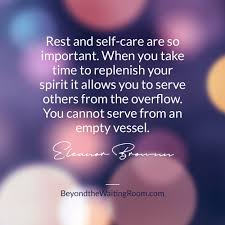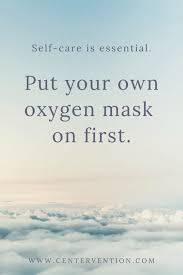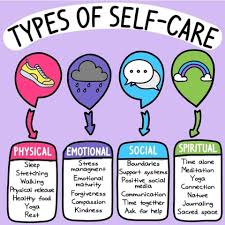What is self-care?
 A worldwide pandemic, and coaching work with several people directly dealing with Covid 19, has got me thinking a lot about self-care. Self-care is an all-encompassing umbrella term for any activity we undertake that proactively looks after our mental, emotional and physical health. One definition says appropriately given current circumstances: “the practice of taking an active role in protecting one’s own well-being and happiness, in particular during periods of stress”.
A worldwide pandemic, and coaching work with several people directly dealing with Covid 19, has got me thinking a lot about self-care. Self-care is an all-encompassing umbrella term for any activity we undertake that proactively looks after our mental, emotional and physical health. One definition says appropriately given current circumstances: “the practice of taking an active role in protecting one’s own well-being and happiness, in particular during periods of stress”.
Self-care isn’t a selfish act either. It is not only about considering our needs; it is rather about knowing what we need to do in order to take care of ourselves, that allows us to take care of others as well. If I don’t take enough care of myself, I won’t be in the place to give to either my loved ones or my clients. This is a challenge for me, having grown up in a house with a teacher and a nurse as parents, whose philosophy was do things for other people first and then look after yourself; this contemporary idea of self-care is a role reversal of putting others first.
 Practicing self-care isn’t always easy. The speed of the modern world, the stress we have in busy lives at work and at home can all mitigate against the need to take time to ourselves. We talk about the idea of “work life balance” but in practice overwork or lack of work-life balance can make people less productive, disorganised and emotionally depleted. In coaching practice self-care comes up time and time again with clients; clients who run businesses and struggle with work-life balance, clients who are senior Managers in organisations dealing with huge pressure due to Covid, clients stuck doing jobs they don’t enjoy but have got boxed in by the salary expectations, or people operating at a senior level in organisations, where they have little “hinterland” of other interests outside of work.
Practicing self-care isn’t always easy. The speed of the modern world, the stress we have in busy lives at work and at home can all mitigate against the need to take time to ourselves. We talk about the idea of “work life balance” but in practice overwork or lack of work-life balance can make people less productive, disorganised and emotionally depleted. In coaching practice self-care comes up time and time again with clients; clients who run businesses and struggle with work-life balance, clients who are senior Managers in organisations dealing with huge pressure due to Covid, clients stuck doing jobs they don’t enjoy but have got boxed in by the salary expectations, or people operating at a senior level in organisations, where they have little “hinterland” of other interests outside of work.
Self-care is a close cousin of personal resilience, which I have written about, along with other “cousins” like self-compassion and meditation/mindfulness practice.
What does it look like?
 Universal wisdom seems to indicate that self-care needs to be something you actively plan, rather than something that just happens. It is an active choice and you should treat it as such.
Universal wisdom seems to indicate that self-care needs to be something you actively plan, rather than something that just happens. It is an active choice and you should treat it as such.
The sort of areas that it includes are:
- Physical self-care: eating healthily and regularly (as well as taking time to eat rather than on the run), taking regular exercise and getting enough sleep
- Psychological self-care: taking time for self-reflection, trying out new things unrelated to work or writing in a journal for example
- Emotional self-care: spending time with loved ones and friends that fill the emotional reservoir, allowing time for comforting activities (and knowing what these are for oneself), or practising self-compassion through things like affirmations or mindfulness
- Workplace self-care: taking breaks during the work day, making quiet time to complete tasks, or getting regular supervision and/or peer support from work colleagues
It also includes things like being organised and on top of things, so you can allow yourself the space to prioritise and focus on important tasks; to be fair its always challenging working with clients where in fact they are really quite organised, but the team or the wider organisation they are working in has too much on and/or in crisis.
It could also include holding onto boundaries where we draw imaginary lines around ourselves to maintain balance and protect our bodies, minds, emotions, and time from the behaviour or demands of others, that allow us some of our own space.
Coaching Tools for self-care
- SELF CARE ACTION PLAN TEMPLATE; a simple 6 step action plan that takes you through steps of how well you look after yourself, the areas of physical, emotional and workplace self care to help you generate ideas for changes and review questions to help you sustain changes
- Self-Care Assessment: an overall self care assessment that gives you an idea of how well you score in a range of self care areas like physical self-care, emotional self-care and workplace self-care
- HEALTH CHECK example: using a simple “dashboard” for a client to focus on areas they want to review progress on; what’s going well, what isn’t working and any changes that might need to be made
- Coaching Review questionairre 2020 Used as a review for people in coaching work, but works just as well as a stand alone self-care review: a detailed questionairre that enables you to assess your progress on a periodic basis including areas like career, finance, health and development.
- Tolerations: Sometimes when people are feeling out of control just being able to tick or give attention and deal with bits and pieces on the list helps. This is a list of “100 tolerations” to review
Other resources
A series of “TED” talks on the importance of self care; there are some excellent talks here